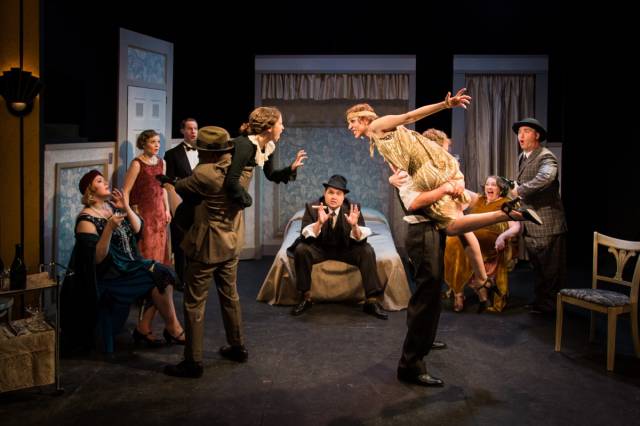

The comic backstager has a long, bright history. (Think of Bottom and the rest of Shakespeare’s hapless mechanicals rehearsing Pyramus and Thisbe.) And—believe it—the genre is not going away anytime soon. (Consider Terrence McNally’s collection of mad theatrical creatures in this Broadway season’s It’s Only a Play.) Show folk seem more than eager to trot out their foibles, sins, and eccentricities for the rest of the world to marvel and laugh at.
George S. Kaufman’s 90-year-old comedy The Butter and Egg Man—currently seen in Manhattan in a staging by Retro Productions, under Ricardo Rust’s direction—trapped in amber the sensibilities of Prohibition-era Broadway theatrical production. Producers Joe Lehman (Brian Silliman) and Jack McClure (Matthew Trumbull) are not just crass, less-than-scrupulous businessmen. They have an almost gangster-ish streak about them. Into their lair steps young Peter Jones (Ben Schnickel), an apparent rube from Chillicothe, Ohio. Romanticizing things theatrical, Jones is soon relieved of most of his savings by Lehman and McClure, who need funds to save a floundering show. They’ve pegged Jones as a kind of thespian sugar daddy: a “butter and egg man.” But Jones has also captured the attention of Lehman’s wary secretary, Jane Weston (Alisha Spielmann). Jane finds herself caught between her allegiance to her boss and her growing affection for Jones.
Kaufman broke from his usual reliance on collaborators to write The Butter and Egg Man by himself. The original production was a critical and popular success. Seen today, the show’s subject matter may seem a bit hackneyed, but there is something appealingly rough-and-tumble in Kaufman’s spirited, fable-like script.
The play’s agreeable qualities turn up in Retro’s production mostly in scenes from the play’s second half—particularly in sequences in which Schnickel and Spielmann figure prominently. They make an attractive, likeable pair. Schnickel lets the naïve Jones’s latent intelligence materialize gradually and believably. And Spielmann brings both a kind-hearted and an intrepid quality to Jane. She comes off as a Jazz Age smart cookie. Another fun performance comes from Ryan McCurdy, as a mournful hotel proprietor who has suffered a worse bite from the theatre-bug than the one Jones sustained.
Unfortunately, many of the other actors in the company of 12 play their roles as overbroad caricatures. At their best, they’re somewhat over the top. At their worst, they seem to have spun completely out of control. There’s much flailing, pounding, prancing, shouting, and grimacing going on, and it pulls the audience out of Kaufman’s story. The actors seem at times to be aided and abetted by director Rust. The pace of the dialogue will slow down to indulge the actors’ displays of cartoonish mannerisms. And in one unfortunate sequence—in which the plot of a play-within-the-play is related—we hear a soundtrack full of wacky noises reminiscent of an old Spike Jones recording.
It may be true that comedy is harder than dying. But pushing the funny is seldom a good strategy. It isn’t a good one here.